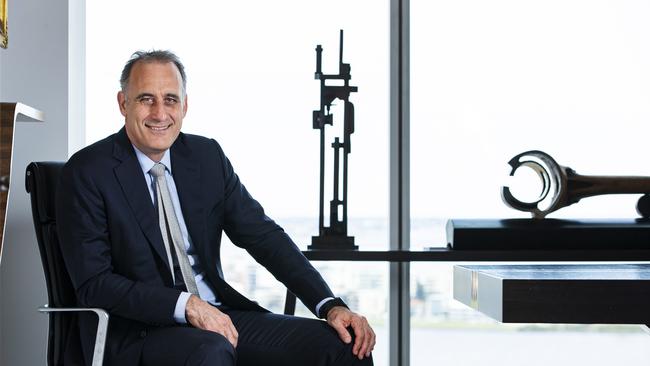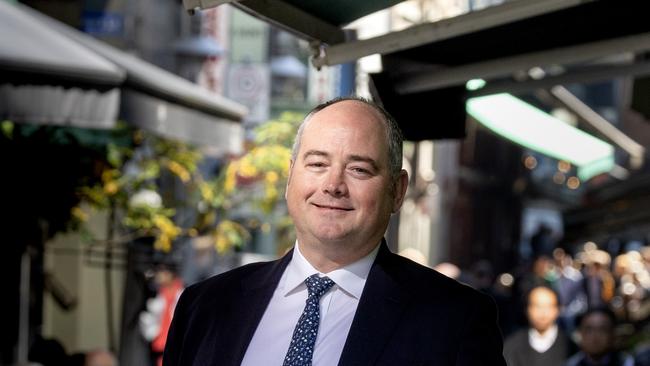CEOs from banks to miners unified in demanding renewed Labor productivity push
Jim Chalmers has promised action on productivity. Now, business leaders say Labor’s majority election win means it must deliver on that pledge.

Major Australian companies including Rio Tinto, Wesfarmers, National Australia Bank and Alinta have demanded Labor use its decisive election victory to boost productivity and improve the lives of Australians to counter the hit to growth from the global trade war.
Australia is battling its worst labour productivity slump on record, falling 1.2 per cent in the last year with average productivity growth over the past decade hitting its lowest levels in 60 years.
That slide has put business leaders on edge amid broader threats to demand from Donald Trump’s tariff stoush and a sinking Chinese economy.
Rio Tinto, Australia’s largest iron ore producer, named productivity reform among its top priorities for the returned Labor government.
“We want to work with the Australian government to support strengthening productivity. This will have a direct impact on our national economy and in turn improve the lives of all Australians,” said Kellie Parker, Rio Tinto’s chief executive for Australia.
“This is an important measure for any government. Ensuring we remain internationally competitive and an attractive place to invest will deliver returns for our national economy.”
Treasurer Jim Chalmers said on Sunday the trade war between the US and China had cast a “dark shadow over the global economy” and conceded Labor must do more to deliver on its productivity vow.
The “first term was primarily inflation without forgetting productivity, the second term will be primarily productivity without forgetting inflation,” Dr Chalmers said.
The Labor majority means Anthony Albanese must now deliver more ambitious change, according to Wesfarmers chief executive Rob Scott.
“The Prime Minister now has the parliamentary standing and opportunity to pursue much needed economic reform,” Mr Scott said.
“It was pleasing to hear the Treasurer’s comments that productivity will be a focus this term, since this will be critical to address economic challenges, help Australia navigate global uncertainties and build a prosperous, more sustainable future for all Australians.”
Dr Chalmers pledged in April that a re-elected Labor government would heed the call of business leaders and pull policy levers to lift productivity.

Mr Scott, whose company is one of Australia’s biggest employers with retail brands including Bunnings, Kmart, Officeworks and Priceline, has previously said sagging productivity represents a direct hit on living standards and adds to sticky inflation.
As living standards erode, this threatens to fundamentally test the social cohesion of the nation.
NAB, which releases its half-year result on Wednesday, said Mr Albanese needed to deliver new solutions to the issue and other key policy areas.
“I’ve said for some time that productivity, housing and energy are the areas Australia must focus on to unlock Australia’s long-term economic growth, while also helping with cost-of-living challenges,” NAB chief executive Andrew Irvine said on Sunday.
“We need new thinking and new solutions. Most critically, we need a continued focus on increasing housing supply, particularly new solutions and innovation in the types of housing and methods of construction across the country.”
The NAB boss has previously pointed to the mining and housing construction sectors as being critical to the economy, warning that they were being crimped by overregulation and higher costs.

One of Australia’s largest energy retailers, Alinta, concurred.
“We really need to address productivity if we’re going to improve the standard of living in this country,” Alinta chief executive Jeff Dimery told The Australian.
Minerals Council of Australia chairman Andrew Michelmore agreed, nominating “dealing with our debt and dealing with productivity” as the aim of a second-term federal Labor.
“And productivity is not spending more hours, it’s actually being more efficient in how you use those hours and what you produce,” Mr Michelmore said.
“That’s what we’ve got to get into everyone, everyone’s got to commit to that and being smarter about how they work.”
The Treasurer reeled off a string of actions related to productivity including changes already announced on a national regime for occupational licensing, changes to non-compete clauses and rebooting Australia’s national competition policy with state and territory governments.
“We’ve got an agenda on productivity, but we can do more, and we will do more,” Dr Chalmers declared on Sunday.
The Productivity Commission issued a warning in March about Australia’s productivity levels that undermined the Treasurer’s optimistic assumptions.
Labour productivity slipped 0.1 per cent in the December quarter and was down 1.2 per cent annually from a flat reading in the previous quarter.
A report from the commission noted that if such a rapid decline were to persist, there would be “serious consequences” for “all Australians”.
“The real problem with labour productivity is that we don’t seem to have improved labour productivity in over 10 years. And this should be the focus for policymakers,” it said.
It picked out the National Disability Insurance Scheme and the childcare sector as potential drags on returns.
The Productivity Commission is due to provide recommendations to the government on boosting productivity in the third quarter of 2025.
Business Council chief executive Bran Black said policy settings must be established to stoke national prosperity.
“We face so many global and domestic uncertainties and challenges — from tariff imposition to changing demographics — and so we must control what is within our scope to control, and that means establishing policy settings that facilitate national prosperity by supporting businesses to thrive,” Mr Black said on Sunday.
“This Parliament must prioritise a productivity agenda that unlocks investment and growth in the private sector, which is ultimately the only way to sustainably boost living standards and lift real wages.”
Labor’s budget papers in March projected a deficit every year until 2035-36 premised on expectations that productivity growth would return to its pre-pandemic levels, government spending did not increase further, and no bracket creep was returned to taxpayers.
However, analysis by the e61 Institute, an independent think tank, dismissed those heroic assumptions, replacing them with more realistic parameters to demonstrate the true pressures on the budget, which is deep in a structural deficit.
The think tank warned of a “significant worsening” in the budget bottom line, which could push to -2.9 per cent of GDP in 2035 and amount to a $100bn deficit in today’s dollars.



